India Mission Trip – November 5-20, 2016 – Part 1
“I Am Your Servant”
The man behind the counter at the medicine shop, which passes for a pharmacy in India, looked at me and smiled as I handed him my credit card. He excitedly exclaimed, “In our culture, you are a god.”
I asked him to repeat what he said. Yes, I had heard him correctly. He had said I am a god. I looked at him and laughed under my breath, “No, I am not a god.”
He said, “Yes.”
I replied, “I am no god!”
In India, the major religion is Hinduism. Nearly 1 billion people in India identify as Hindu. That is 80% of the population. There are thirty-three major gods in Hinduism. Some would say there are 330 million gods. There is a strong belief in one consciousness that manifests itself in infinite ways. Therefore, even a worm is a god. I am not a god, but I am a worm, as Isaac Watts declared, “Would He devote that sacred head for such a worm as I?”
William Carey, known as the father of the modern missions movement and also a missionary to India, had written on his tombstone this simple statement, “A wretched, poor, and helpless worm, On Thy kind arms I fall.”
I went to India with the purpose of serving precious believers in this spiritually darkened country. Four hundred million people in India have never heard the name Jesus. One-third of the world’s unreached people groups are in one country: India. I wasn’t going as a celebrity, definitely not a god, but as a servant.
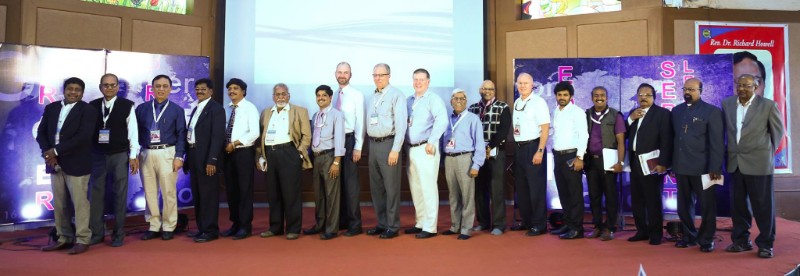
Good News 360 Conference Coordinators
At the invitation of EMU missionary Billy J, I was thrilled to have the opportunity of speaking at the first annual Good News 360 Conference. I joined five other Americans in making the trip up and over the polar region to Mumbai and then on to Hyderabad. My travel day began at 4:00 a.m. on Saturday, November 5, as my wife Joanna drove me to the Greenville-Spartanburg Airport. My flight left at 6:00 a.m. for Newark. I was traveling with Mike LaPierre, founder of Christian Leadership Worldview International. Mike is a former professional baseball player and a former executive with UPS. We really got to know each other during our 11-hour layover in Newark. The flight from Newark to Mumbai was a brutal fourteen hours. We were glad to make it to India. But there was one problem – my luggage was still in Newark. It was a minor inconvenience, and it arrived at Billy J.’s door two days later. After another nine-hour layover, we flew from Mumbai to Hyderabad. In all, from the time I left home until the time I arrived at Billy J.’s house, I had been traveling forty-two hours.
On the ride from the airport in Hyderabad to Billy’s house, we experienced what to me looked like mass chaos, but to Indians it is just a way of life. I’m talking about their crazy driving. First of all, we were driving on the wrong side of the road. Well, not really. Like in the United Kingdom, Indians drive on the left side of the road. That was just a minor adjustment for my psyche. The real jolt was riding in traffic that would make the world’s scariest roller coaster seem tame. I’m sure I could fill an entire article describing our adventures on the roads of India. I still don’t think I would be able to capture the sheer terror that we experienced. I must say, though, that I found the Indians to be delightful people. Most were extremely friendly and helpful. But their driving is nuts! I told Billy if this missions thing doesn’t work out for him, he could be a Formula 1 driver.
The next day, Mike and I met up with the other Americans. All four of them are from the Raleigh, NC, area. Pastor Scott Wylie and Paul Funchess serve on the staff at Colonial Baptist Church in Cary, NC. Dr. Jerry Knoblet serves on Adjunct Faculty at Shepherds Theological Seminary in Cary, NC. Russ Andrews is the founder of Finding Purpose, a men’s ministry in Raleigh, NC. Each of us was asked to speak on one of the four themes of the conference: Preaching, Praying, Equipping, and Servant Leadership.
That evening we had a wonderful time meeting with the Indian executive committee members for the conference. This was their first effort at a national leadership conference. Some people traveled two days to participate. There were a total of 570 delegates participating, from nine different States of India. The organizational meeting that first night with the leaders set the tone for a great conference. The purpose of our meeting was for worship and prayer. I had a tremendous time getting to know these men who are in the trenches serving God in India. We later shared a buffet supper with these leaders.
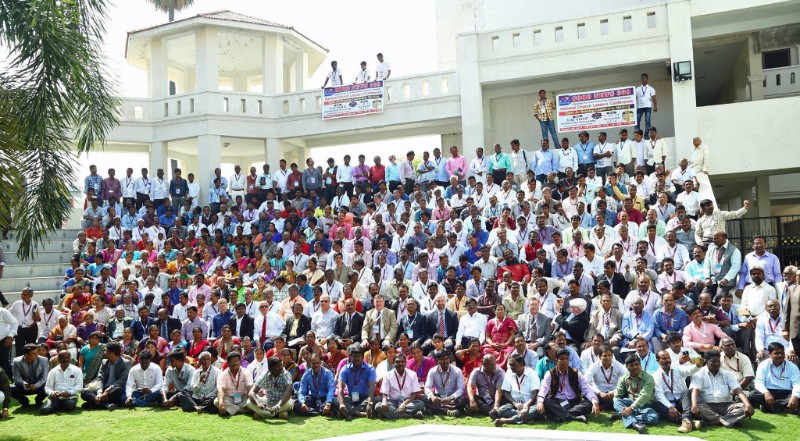
360 Conference delegates, coordinators, & speakers
If Ken would allow me the space in a newsletter, I could fill it with descriptions of the foods of India. Fortunately, I love spicy food. I thought many times that India is a place for sensory overload. The sights, the sounds, the tastes, and even the smells, covered the range of expectations.
The next morning, we began the conference at the Ashirwad Global Learning Centre. We could not have asked for a better place to meet. It is a beautiful 3-acre campus that is like an oasis of refreshment in the middle of all the hustle and bustle of India’s fourth largest city, Hyderabad. There is a large meeting room, a nice outside amphitheater, and smaller meeting rooms which accommodated the workshops. The delegates stayed in dorm rooms with bunk beds, and the speakers were in hotel-type rooms on the top floor.
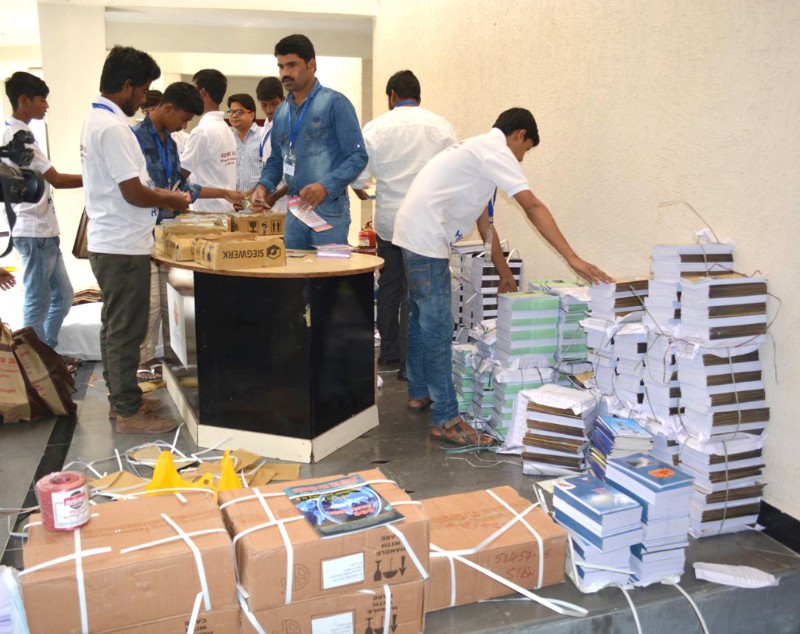
Each delegate received conference notes and several books to add to their libraries
The meeting began with an organizational time in the auditorium where all the speakers introduced themselves. We then had a general session followed by lunch. I learned for the first time that Indians eat with their hands. Dr. Chiranjeevi, one of the speakers and the director of the Ashirwad Centre, showed me how to mix the food together and then scoop it into my mouth. When in India, do as the Indians do. Joanna would have died had she seen me plunge my hands into my spicy meal of chicken curry and rice.
After lunch we began our workshops. I was asked to speak on the theme of servant leadership. This is a needed topic because the Indian culture is still influenced by the caste system. Leaders are expected to be tough and domineering. I spoke on the subject of “True Greatness” from Matthew 20. In verse 25, Jesus describes the way the world thinks about leadership. But Jesus called them unto him, and said, Ye know that the princes of the Gentiles exercise dominion over them, and they that are great exercise authority upon them. He then gives a mind blowing message to His disciples in verses 26-27, But it shall not be so among you: but whosoever will be great among you, let him be your minister; And whosoever will be chief among you, let him be your servant. Literally Jesus is saying if you want to be great then you must be a servant. If you want to be first you must be a slave. That word slave strikes a chord with the Indian believers. They understand the meaning because of the lingering influences of the caste system. According to the Global Slavery Index, with 18 million people in slavery, India is home to the largest number of enslaved people in the world. I tried to teach our precious brothers and sisters that there is dignity in being called a slave. That dignity is tied to our Master. Jesus Christ is our Master, and we are His slaves.
Because the organizational meeting earlier in the day had gone so long, we had to cancel the 2nd workshop. We took a break, and then we met again, this time for praise and worship. The Indians like their music very loud, and they sing with much passion. While we sat, different people would randomly get up and sing. After about half an hour of music, we then heard from two more speakers. Like they do in Uruguay, we had supper around 9:00 p.m. Everyone then returned to their rooms physically exhausted, but spiritually refreshed.
Billy had done a great job organizing the conference. In all he did, he was trying to make all of us happy. I did my best to help alleviate any pressure. I kept telling him, “I am your servant.” It was hard for their leaders to accept this, but each of us from America didn’t want to be celebrities, but servants. We went out of our way to try to shake hands and to talk with and pray for the Indians. We enjoyed special times before and after the meetings just listening to their stories. These stories would fill a binder full of newsletters. There were stories of struggles that they were facing. There were also stories of victories that they were celebrating that were nothing short of miraculous.
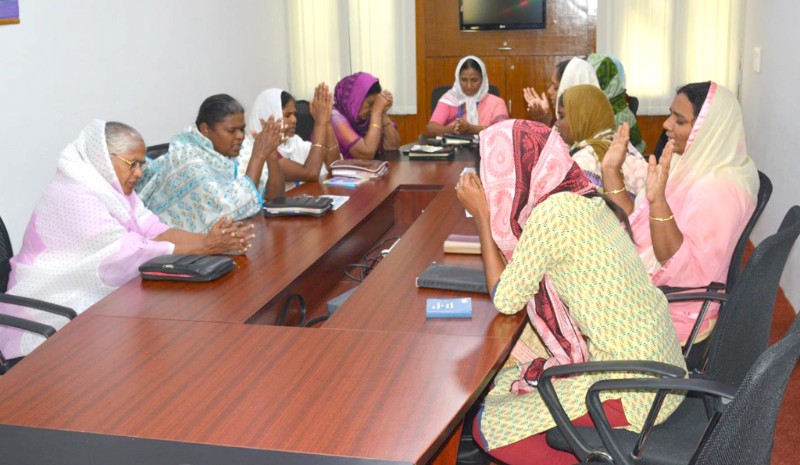
These ladies prayed everyday during the general sessions.
Their lanyards read: The Prayer Warriors.
Day 2 of the conference was a full schedule that began with an early morning visit from an Indian that just wanted to talk. We sat in my room, and I listened to his story. He was part of the security detail that Billy had organized to escort the speakers around the conference. I cannot express enough how thorough the committee had planned for the meetings. There were six general sessions that day and three workshops. I spoke in two of the general sessions and led three workshops. I preached on John 13, a message I entitled, “Swollen Heads and Stinky Feet.” We saw in this text Jesus modeling servant leadership when he washed the disciples’ feet. You will recall from that text that Jesus washed 24 dirty feet and 12 proud hearts. I asked the question of the group, “How many people had their feet washed?” The obvious answer was 12. Then I asked, “How many people were in the room?” After a short pause, they answered, “13.” The Bible doesn’t say it specifically, but we have every reason to believe that Jesus went back to the table without having His feet washed. The challenge is for us to understand His command to wash one another’s feet. This should be taken literally, and I assume it was as they gathered again in the Upper Room for prayer following the resurrection. Jesus was also teaching the principle of serving one another. I also believe there is a deeper meaning in that when we serve one another, we are washing our Lord’s feet. As ye have done it unto one of the least of these my brethren, ye have done it unto me. Matthew 25:40.
For the workshops, I spoke on Philippians 2:1-18. I looked at three points about humility. We looked first at the exhortation to humility, then the example of humility (Jesus Christ), and finally the evidences of humility. This set the stage for my final session that day when I zeroed in on Philippians 2:12-15. I spoke about Biblical change. We saw the tension that is felt when Paul commands us to work out your own salvation. He then reminds us that it is God that works in you. We saw how change for the Christian is more like a sailboat than a motor boat. We are not totally passive. We have to set the sails and steer with the rudder, but we cannot supply the wind.
This was another full day, and after speaking five different times, it didn’t take me long to fall asleep that night.
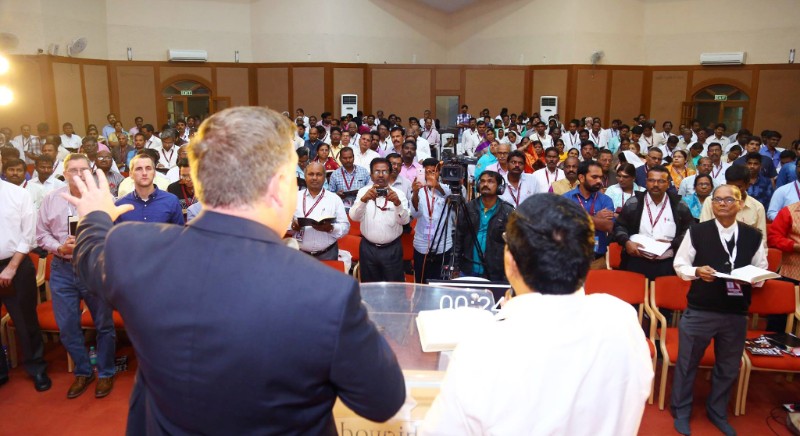
Preaching at a general session with a translator
The final day of the conference was such a tremendous blessing. I was given the privilege of leading the entire assembly in a couple of English songs. I had all of the American speakers join me on the stage. We sang, “I Have Decided to Follow Jesus.” The Indians knew that song well, and the declaration of commitment echoed throughout the assembly hall. Next, we taught them “In Christ Alone.” It only took a verse for them to learn the tune and join us in singing. I wish there was a way that my words could capture the emotion we all felt as the 500 of us with different skin colors and different languages, even accents, declared “Here in the pow’r of Christ, I’ll stand.”
There were a couple of general sessions and then a time of recognizing each of the speakers and workers. I had the opportunity to give a final charge to the delegates. I chose Psalm 67 as my text. This was just a brief five-minute reminder of what God is doing among the nations. The leaders then spread throughout the room and with lifted hands prayed over each of the delegates. Following this time, every delegate’s name was called and they received a certificate for participating in the conference.
I want to thank each of you that prayed for the conference and those who prayed for me specifically. I truly believe God was honored at this conference. God is doing an amazing work in India.
In the next newsletter, I will tell you about the second week of my trip in India when I had the opportunity of visiting and preaching in several churches and Bible schools. I will share with you what I learned about Hinduism and Islam, and how they dominate the religious thinking of this dark land. I also will describe the influence that Baptist missions has had on this part of India. What a joy it was for this worm to serve God for a couple of weeks in India.